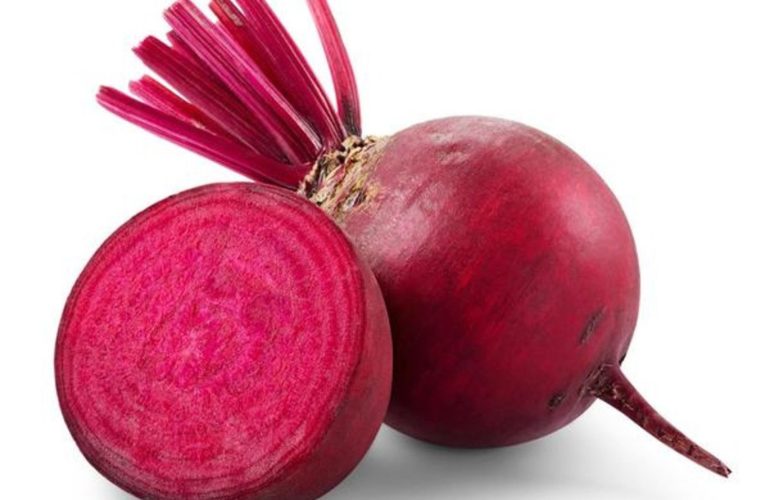Beet is a root vegetable and a natural “superfood” that offers powerful health and nutritional benefits.
Beetroot is also known as “Chukunder”. Due to the presence of essential nutrients such as folate, potassium, iron and vitamin C it’s considered great for women.
It also has high content of betanin, inorganic nitrates and antioxidants, and yet another reason you should add it to your diet.
Nutritional Facts of one Cup Raw Beetroot
| CALORIES | 58 Kcal |
| CARBS | 12 g |
| FIBER | 4 g |
| PROTEIN | 2.2 g |
| FAT | 0.2 g |
| FOLATE | 148 mg |
Other nutrients in beetroot include potassium, manganese, magnesium, iron, Vitamin C, and biotin.
Beetroots have a glycemic index (GI) score of 61, which is considered medium. On the other hand, the glycemic load of beetroots is only 5, which is very low.
This means that beetroots should not have a major effect on blood sugar levels because the total carbohydrate amount in each serving is low.
Plant compounds in beetroots are:
Betanin.
Also called beetroot red, betanin is the most common pigment in beetroots, responsible for their strong red color. It is believed to have various health benefits. It helps to capture troublesome toxins and flush them out of the system via the urinary tract.
Inorganic nitrate.
Inorganic nitrate turns into nitric oxide in your body and has many important functions.
Beets are rich in silicone and folic acid, therefore they can be beneficial to the female reproductive system.
Can also be used with carrots for hormone regulation during menopause. Great combo for nutritional absorption
HEALTH BENEFITS OF BEETROOT
- Improves exercise performance
- Nitrate in Beetroot can enhance physical performance, particularly during high-intensity endurance exercise. Dietary nitrates have been shown to reduce oxygen use during physical exercise by affecting the efficiency of mitochondria, the cell organs responsible for producing energy. Beets and their juice are often used for this purpose because of their high inorganic nitrate content.
- Consumption of beetroots may improve running and cycling performance, increases stamina, boost oxygen use, and lead to better exercise performance overall.
- Aids and cleanse the liver.
- Great for heart health.
- May help lower blood pressure.
- High in fiber : keeps you full and improves digestion.
- Promotes menstruation.
- Help support healthy blood sugar levels (The high levels of alpha lipoic acid found in beets seem to offset the effects of the beet sugar.)
- Improves blood circulation.
- Helpful in anemia.
- Shows Anti inflammatory effects.
- Helps cure depression.
- Beetroot also contains betaine, a substance that relaxes the mind and is used in other forms to treat depression. It also contains tryptophan, which is also found in chocolate and contributes to a sense of well-being.
- Highly nutritious and low on calories.
- Support Brain health.
- Aids in lose weight.
- Shows Anti-aging properties

Beetroot Ayurvedic properties
- Beets are of sweet taste, heavy quality, cooling metabolic effect, and pungent post-digestive taste.
- They pacify Vata but could aggravate Kapha and Pitta if not cooked with balancing spices and other ingredients.
- Cooked beets transform the starches into sweeter sugars that are cooling.
- Possible Adverse Effects.
- Generally safe for everyone.
- Beetroots are usually well tolerated — except for individuals prone to kidney stones.
- Consumption of beetroot may also cause your urine to become pink or red, which is harmless but often confused for blood.
- Oxalates : Beet greens contain high levels of oxalates, which can contribute to kidney stone formation
- It can cause unpleasant digestive upset in sensitive individuals, such as those with irritable bowel syndrome (IBS).
Interesting ways to add more beets to your diet
- Steamed Beetroot salad.
- In Juice or smoothies.
- Beet Sabzi.
- Beetroot Dips.
- In dough or batter Cheela or dosa.
- In baking dishes.
- Overnight oats and puddings.
Make sure to consume this “WONDER INGREDIENT” and experience its benefits.
